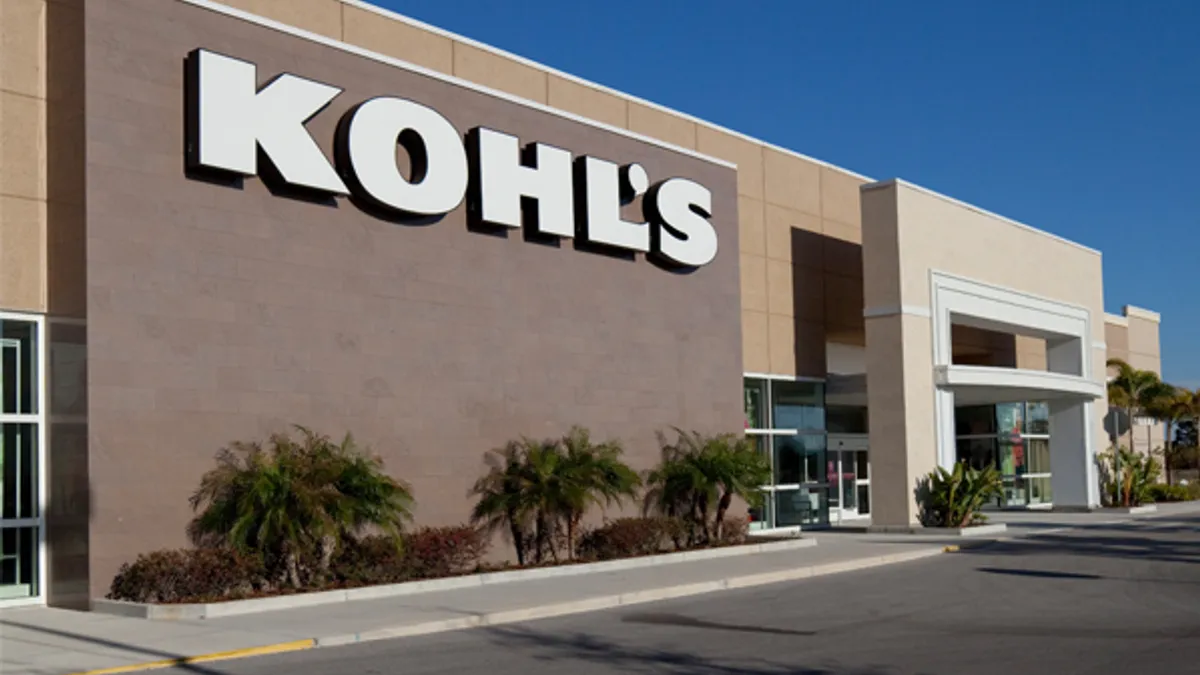Dive Brief:
-
Kohl's on Tuesday said that in the first quarter, with all stores closed since March 20 due to the pandemic, total revenue plummeted 40.6% to $2.4 billion.
-
Net sales were down 43.5%, compared to last year's 3.3% decline, with no store comps reported due to the closures. Profits swung 973% downward to a $541 million loss, from net income of $62 million in the year-ago quarter, as margins shrank by 1,950 basis points to 17.3%, according to a company press release.
-
Following state-by-state guidance, half of the company's stores have reopened since May 4, CEO Michelle Gass said during a conference call with analysts Tuesday.
Dive Insight:
Kohl's is entering a period of cautious reopening of stores with meaningful advantages over some rivals, not least that 95% of its stores are away from malls.
Gass called that a unique advantage because those stores, which she called "the lifeblood of Kohl's," are "located ... where our customers live and work," and characterized them as having an advantage in social distancing as stores reopen. Research shows that U.S. consumers remain leery of shopping at traditional enclosed shopping centers, which analysts believe will accelerate the closure of many of those malls, and the department stores that anchor them.
Other advantages in the quarter were also helpful during the crisis, namely that Kohl's closed its stores later in March than most of its peers and that the retailer sells a lot of the athletic and athleisure apparel that has been especially popular at the moment, noted GlobalData Retail Managing Director Neil Saunders.
"The upshot is that if a reasonably well positioned retailer like Kohl's is posting such bad numbers, it does not bode at all well for much weaker players in the market," he said in emailed comments.
But opening stores will nevertheless not be all that helpful to Kohl's, where store traffic was already weak. People are all the more cautious of gathering in physical spaces, and demand for apparel "especially work and occasion wear – remains severely suppressed," he said.
As the retailer resumes trade, it's taking some steps to address that. The company will discontinue eight underperforming brands, including the Dana Buchman, Jennifer Lopez, Popsugar and Juicy Couture labels, and is introducing Lands' End and Tom's to its assortment, Gass said. The company is continuing with Simply Vera Wang, Sonoma, Nine West, its Violet tween brand and others, she said.
While the retailer remains dependent on brick and mortar, where a partnership to take Amazon returns designed to spike traffic has yet to resume, it's also taking steps to boost e-commerce. Online sales benefited from a new drive-up pickup service established while stores were shuttered, and the retailer plans to boost that channel longer term.
The company ended the quarter with inventory down 3% and "inventory receipts meaningfully lower." Other steps in the quarter taken to shore up finances included cutting marketing, technology, operations and payroll expenses, among others; cutting capital expenditure plans by about $500 million; suspending share repurchases and its regular quarterly cash dividend; replacing and upsizing its revolver to $1.5 billion secured facility; and issuing $600 million notes due 2025, per the release.
With more debt and sales and profits under pressure, the retailer faces an uncertain future, even if it retains some advantages compared to rivals, Saunders warned. "Given that the company will not simply make up for all the trade and profits lost during this quarter, that debt will be a future burden and will reduce the flexibility of the company to invest and evolve," he said. "The rebuild will be incredibly slow and we expect some very weak results in the near-term."















